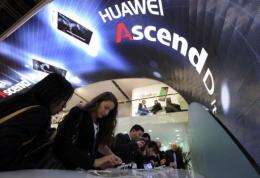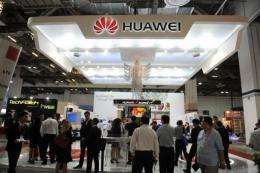Deals and ordeals for Chinese tech giant Huawei

Chinese telecom giant Huawei is perplexed at its treatment in the West, with the United States fearful it is a Trojan horse for cyber warfare even as Europe eagerly courts its business.
The contrast was stark last week when the private company's elusive founder and chief executive officer, Ren Zhengfei, appeared alongside British Prime Minister David Cameron at the signing of a $2 billion investment deal in London.
The following day in Washington, US lawmakers grilled a Huawei executive over their suspicions that the Shenzhen-based company's communications infrastructure is a platform for Chinese espionage and, potentially, sabotage.
The House Intelligence Committee hauled the executive in for questioning at the start of a September 13 hearing into "security threats" posed by Huawei and another Chinese firm, ZTE, as part of a probe launched last year.
Charles Ding, a corporate senior vice president of Huawei, told the panel: "Our customers throughout the world trust Huawei. We will never do anything that undermines that trust."
He added: "Let me be clear—Huawei has not and will not jeopardise our global commercial success nor the integrity of our customers' networks for any third party, government or otherwise. Ever."
But after some at times testy exchanges with the Chinese executives, committee chairman Mike Rogers said he remained unconvinced.
"I was hoping for more transparency, more directness in some of the answers," Rogers said.
The fear in the United States and other countries is that Huawei, the second largest provider of carrier network infrastructure in the world, will allow its platforms to be manipulated by the Chinese government.
Whether through the use of "back door" security loopholes or via the direct supply of sensitive information at Beijing's behest, many in the United States believe Huawei's systems pose a potential threat to national security.
The firm has been forced to back away from several North American investments amid pressure from Washington, while Australia earlier this year blocked it from bidding for contracts on a huge national broadband network.
European governments share these concerns, but have found ways to do business anyway. British officials, for example, scrutinise the company's source code to make sure its equipment is operating securely.
Huawei signed its first European contract in 2005 and now works alongside all major telecoms operators and broadband Internet providers in Britain as well as many other countries in Europe, where its sales grew 27 percent last year.

"The investment announced by Huawei... demonstrates once again that the UK is open for business," Cameron said on September 12 as he announced Huawei's latest deal alongside Ren.
"The British government values the important relationship with China, both countries have much to offer each other and the business environment we are creating in the UK allows us to maximise this potential."
Ren has never given an interview to the media and his statement to the press in London—where he praised the UK as a "a centre of innovation"—is part of broader efforts to enhance Huawei's image around the world.
"We take a really long-term view as an investor, both in Europe and in the US. Maybe in the past we haven't explained ourselves well enough," Huawei's vice president for international media affairs, Roland Sladek, told AFP.
"We are grateful about the investment conditions in the UK and being able to grow in Europe, and we would welcome similar conditions everywhere else."
Despite Huawei's new transparency drive, its leader declined an AFP request for an interview for this article.
"He focuses on customer needs and innovation, so he has never given any interviews," Sladek explained.
The former People's Liberation Army soldier founded Huawei in 1987 with a few thousands dollars, and has turned it into a $32-billion-dollar company second only to Sweden's Ericsson in its field.
The 67-year-old now provides strategic vision while leaving day-to-day operations to his board, Sladek said, describing his boss as a "pure entrepreneur".
In a letter published in April with Huawei's annual report—itself a new exercise in openness—Ren likened the company's year-old system of rotating chief executives to the rise and fall of Chinese dynasties.
"Even if we fail, we will not regret our choice because we have blazed a new trail," he wrote.
(c) 2012 AFP


















